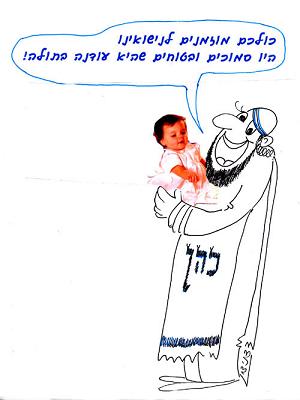
The early sages (the Tanaaim) ruled that a cohen is forbidden to marry an aylonit, a woman who cannot have children because of a physiological defect in the sexual characteristics. [Aylonit is from the root of ayal, the buck which symbolizes masculinity. This woman has male characteristics; she has no breasts like a normal woman, penetration into her vagina is extremely difficult and therefore it is difficult for her to have sexual relations, the flesh of her sexual organ is not prominent as it is amongst other woman, her voice is thick and one cannot tell if it is a male of female voice (Yevamot 80b). Whether an aylonit actually ever existed is unclear and it seems that one could not find an aylonit as defined in the Talmud, and all such discussions are Halachic fictions.] One of the sages ruled that a cohen is forbidden to marry an aylonit because the aylonit is the harlot mentioned in the Torah, and a cohen is forbidden to marry a harlot according to the laws of the Torah; it is written “And the Lord said to Moses, ‘Speak to the cohanim…They shall not take a wife who is a harlot or a defiled woman.” How did the sage know the aylonit is a harlot? Answer: It is written in the Prophets “They shall commit harlotry, but not increase” (Hosea 4:10), meaning that harlotry is sex without procreative intent — they shall not increase by bringing forth children. The aylonit cannot have children, and so she is considered a harlot. In the words of the sages, “Any intercourse which cannot lead to increase is licentious intercourse.” One of the early sages, Rabbi Eliezer, ruled that a cohen is forbidden to marry a minor. One of the scholars explained the sage’s reason — since the minor is still of an age when it is unclear if she is an aylonit or not [one is definitively ruled an aylonit at the age of 20 if she has not grown pubic hair and breasts] there is fear she will be revealed to be an aylonit and so the cohen will be found to have married a harlot. The scholars questioned this, stating that the sage Rabbi Eliezer did not really think that the aylonit was considered to be a harlot.
Here the sages disagreed about the harlot mentioned in the Torah. According to Rabbi Akiva a harlot is one who lets her body freely to many. According to a different sage a harlot is one who has sexual relations with a man with whom she is forbidden to have sexual relations. According to yet another sage a convert is a harlot. According to Rabbi Eliezer any sexual congress which is not for marital purposes is harlotry: “A single man who has relations with a single woman without marital intent has made her a harlot.” Does this not mean that according to Rabbi Eliezer an aylonit is not a harlot? One of the scholars explained Rabbi Eliezer’s ruling that a cohen should not marry a minor in the following way: Rabbi Eliezer meant that a High Priest should not marry a minor, because the acquisition part of the marriage takes effect only when she is grown and at that point she is no longer a virgin, yet according to the Torah’s laws the High Priest must marry a virgin. One of the scholars, Rava, responded that this explanation is empty and meaningless, wearying to any reasonable person, for the High Priest may wed a minor through the agency of her father and then the marriage is immediately valid. Another explanation given for Rabbi Eliezer’s ruling that a cohen should not marry a minor is that since a young girl is unreasonable, there is a likelihood that she will commit adultery with others and be licentious while a married woman. The scholars asked: If so, even a Jew who is not a cohen should not marry a minor, lest she commit adultery. Answer: A minor girl who has committed adultery because she has been seduced is considered as the victim of a rape, but since a cohen must divorce his wife if she has been raped, he should not marry a minor. But a Jew who is not a cohen may continue to live with his wife who has been raped, so he may marry a minor. According to another scholar, Rav Papa, Rabbi Eliezer’s reason is that a High Priest should not marry a minor due to his interpretation of the Torah’s law which states “he shall take a virgin of his own people as wife” (Leviticus 21:14). “Wife” implies a grown woman, meaning that a High Priest is forbidden to marry a minor.
(Babylonian Talmud, Tractate Yevamot 61a-b)
